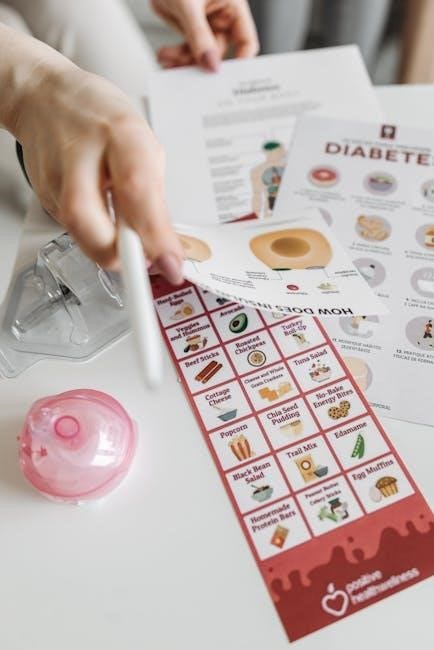The Hormone Type 7 Diet Plan focuses on balancing hormones like insulin, cortisol, and estrogen to support weight management and overall well-being through targeted dietary strategies․
1․1 What is the Hormone Type 7 Diet?
The Hormone Type 7 Diet is a personalized plan addressing imbalances in insulin, cortisol, and estrogen․ It focuses on tailored food choices, stress management, and lifestyle changes to restore hormonal balance, promoting weight loss and overall health through strategic dietary adjustments․
1․2 Importance of Hormonal Balance for Weight Management
Hormonal balance is crucial for effective weight management, as hormones like insulin, cortisol, and estrogen regulate metabolism, fat storage, and appetite․ Imbalances can lead to weight gain, while proper balance enhances fat burning, reduces hunger, and supports overall metabolic health, making it easier to maintain a healthy weight․

Understanding Hormone Type 7
Hormone Type 7 refers to a specific hormonal profile linked to weight management challenges, primarily involving imbalances in insulin, cortisol, and estrogen, impacting metabolism and fat storage․
2․1 Characteristics of Hormone Type 7 Profile
Hormone Type 7 is marked by imbalances in insulin, cortisol, and estrogen, leading to challenges in weight management, increased fat storage, and metabolic slowdown․ Common traits include insulin resistance, stubborn belly fat, and difficulty losing weight despite calorie restriction; The profile often responds well to dietary adjustments targeting these hormonal imbalances․
2․2 Role of Insulin, Cortisol, and Estrogen in Weight Management
Insulin regulates blood sugar and fat storage, while cortisol promotes fat retention, especially in the abdominal area․ Estrogen influences fat distribution and metabolism․ Imbalances in these hormones can lead to weight management challenges, making hormonal balance crucial for effective weight loss and metabolic health in Hormone Type 7 individuals․
Key Principles of the Hormone Type 7 Diet Plan
The Hormone Type 7 Diet focuses on protein-rich meals, healthy fats, and high-fiber foods to stabilize insulin and cortisol, promoting fat loss and hormonal balance effectively․
3․1 Protein-Rich Foods for Appetite Control
Protein-rich foods like lean meats, fish, eggs, and legumes are essential for appetite control in the Hormone Type 7 Diet․ Protein reduces ghrelin, the hunger hormone, promoting satiety and aiding in weight management by stabilizing blood sugar levels and supporting metabolic function effectively throughout the day․
3․2 Incorporating Healthy Fats and Omega-3 Fatty Acids
Fatty fish like salmon and sardines are rich in omega-3s, which reduce inflammation and support hormonal balance․ Avocados, nuts, and seeds also provide healthy fats, aiding in satiety and insulin sensitivity, while promoting energy production and overall metabolic health in the Hormone Type 7 Diet plan․
3․3 High-Fiber Foods for Insulin Sensitivity
High-fiber foods, such as chia seeds, flaxseeds, and leafy greens, improve insulin sensitivity by slowing sugar absorption․ They support a healthy microbiome, enhance insulin metabolism, and promote balanced blood sugar levels, crucial for hormonal balance in the Hormone Type 7 Diet plan․
3;4 Stress Management Techniques
Stress management techniques like meditation, yoga, and deep breathing help reduce cortisol levels, promoting hormonal balance․ Regular exercise and adequate sleep also support stress reduction, enhancing insulin sensitivity and overall well-being in the Hormone Type 7 Diet plan․
3․5 Hydration and Sleep Importance
Hydration is crucial for digestion and nutrient absorption, while sleep regulates hormones like insulin and cortisol․ Prioritizing 7-9 hours of quality sleep and drinking plenty of water supports metabolic balance and overall hormonal health in the Hormone Type 7 Diet plan․
Sample 7-Day Hormone Type 7 Meal Plan
A structured 7-day meal plan designed to balance hormones, featuring protein-rich meals, healthy fats, and fiber, with options like smoothies, chia pudding, and fatty fish for optimal weight management․
4․1 Day 1: Hormone-Balancing Smoothie and Balanced Meals
Start with a hormone-balancing smoothie blending frozen berries, banana, flaxseed, chia seeds, spinach, and unsweetened almond milk․ Pair with balanced meals featuring lean proteins, whole grains, and vegetables to stabilize hormones and support metabolism throughout the day effectively․
4․2 Day 2: Chia Seed Pudding and Fatty Fish Incorporation
Begin with chia seed pudding mixed with almond milk, cinnamon, and vanilla, topped with berries and flaxseeds․ Include a mid-morning snack of walnuts․ Incorporate fatty fish like salmon for Omega-3s, which reduce inflammation and support metabolism․ Balanced meals focus on lean proteins, whole grains, and vegetables, ensuring nutrient-rich, portion-controlled nutrition throughout the day․
4․3 Day 3: Bone Broth and Plant-Based Milk Options
Bone broth serves as a nutritious breakfast, offering anti-inflammatory benefits and essential nutrients․ Plant-based milk options like almond or oat milk can be used in smoothies or as dairy substitutes․ Balanced meals include lean proteins, whole grains, and vegetables, ensuring a varied and nutrient-rich diet throughout the day․ Herbal teas and water aid hydration․
4․4 Day 4: Meal Prepping Strategies
Meal prepping involves planning and preparing meals in advance to ensure consistency․ Create a grocery list based on the meal plan and shop for necessary ingredients․ Batch cook proteins, sides, and chop vegetables, storing them in the fridge or freezer for easy access throughout the week․ This saves time and reduces stress․
4․5 Day 5: Mediterranean-Style Diet Adaptation
Adapt the Mediterranean diet by incorporating whole grains, lean proteins, and healthy fats․ Include fatty fish like salmon for Omega-3s, which reduce inflammation and boost energy․ Use olive oil for cooking and dressings․ This approach supports hormonal balance, improves insulin sensitivity, and promotes overall well-being while aligning with the Hormone Type 7 principles․
4․6 Day 6: Detox and Cleanse Focus
Focus on detoxifying with leafy greens, cruciferous vegetables, and bone broth to support liver function․ Incorporate chia seeds and plant-based milks to enhance cleansing․ Stay hydrated with herbal teas and include green tea for antioxidants․ Pair meals with stress-reducing practices like meditation or yoga to promote overall detoxification and hormonal balance naturally․
4․7 Day 7: Maintenance and Long-Term Commitment
Focus on reinforcing healthy habits by meal prepping and batch cooking․ Incorporate physical activity and mindfulness practices to maintain hormonal balance․ Emphasize consistency, gradual progress, and self-care to ensure long-term success․ This day reinforces the importance of sustainable lifestyle changes over quick fixes, promoting overall well-being and continued weight management․
Foods to Include and Avoid in the Hormone Type 7 Diet
Focus on whole, nutrient-rich foods like lean proteins, healthy fats, and high-fiber vegetables․ Avoid processed sugars, refined carbs, and hormone-disrupting foods to support hormonal balance and weight management effectively․
5․1 Beneficial Foods for Hormonal Balance
Incorporate fatty fish like salmon for omega-3s, leafy greens for fiber, and berries for antioxidants․ Chia seeds, flaxseeds, and bone broth also support hormonal balance by reducing inflammation and promoting nutrient absorption․ These foods help stabilize hormones like insulin, cortisol, and estrogen, aiding in weight management and overall well-being․
5․2 Foods to Limit or Avoid
Processed foods, sugary snacks, and alcohol disrupt hormonal balance by causing insulin spikes and inflammation․ Limit refined carbohydrates and opt for whole, nutrient-dense foods․ Avoid excessive caffeine and dairy if inflammatory responses occur, as they may hinder progress in balancing hormones like insulin and cortisol․

The Role of Meal Prepping in the Hormone Type 7 Plan
Meal prepping enhances efficiency, reduces stress, and ensures adherence to dietary goals by preparing balanced meals in advance, aligning with the plan’s focus on hormonal balance and weight management․
6․1 Tips for Effective Meal Preparation
Plan meals weekly, create a grocery list, and shop in advance․ Batch cook proteins, sides, and prep veggies to save time․ Portion meals in containers for convenience and label with dates for organization․ This structured approach ensures consistency and adherence to the Hormone Type 7 dietary guidelines effortlessly․
6․2 Grocery Shopping and Planning
Create a detailed grocery list based on your meal plan to avoid impulse buys․ Shop for whole, unprocessed foods like proteins, healthy fats, and fiber-rich vegetables; Organize your list by store sections to save time․ Prioritize seasonal and organic options when possible to maximize nutrient quality and flavor․

Lifestyle Changes for Success
Incorporate regular exercise, stress management, and adequate sleep to support hormonal balance․ These changes complement dietary adjustments, promoting sustainable weight management and overall health improvement․
7․1 Exercise and Physical Activity
Regular physical activity supports hormonal balance by improving insulin sensitivity and reducing cortisol levels․ Incorporate strength training, cardio, and flexibility exercises to enhance metabolism and overall well-being․ Aim for at least 30 minutes of moderate exercise most days to promote sustainable weight management and stress reduction;
7․2 Sleep Quality and Duration
Prioritizing sleep is crucial for hormonal balance․ Aim for 7-9 hours of quality sleep daily to regulate cortisol and insulin levels․ Poor sleep disrupts hormones, potentially leading to weight gain․ Establish a consistent sleep schedule and create a relaxing bedtime routine to enhance sleep quality and support overall well-being․
7․3 Mindfulness and Meditation Practices
Mindfulness and meditation are powerful tools for reducing stress and balancing hormones․ Regular practice helps lower cortisol levels, improve insulin sensitivity, and stabilize estrogen․ These practices enhance mental clarity, emotional stability, and overall well-being․ Incorporate daily meditation sessions and deep breathing exercises to support hormonal health and maintain a calm, focused mindset․

Monitoring Progress and Adjustments
Regularly track weight, body fat, and energy levels to monitor progress․ Adjust the diet plan based on hormonal changes and physical responses․ Consistency is key for optimal results․
8․1 Tracking Hormonal Changes
Monitor hormonal shifts through blood tests, symptom observation, and energy levels․ Track insulin, cortisol, and estrogen levels to assess balance․ Regular check-ins ensure the diet’s effectiveness and guide necessary adjustments for optimal weight management and overall health․
8․2 Adjusting the Diet Plan as Needed
Periodically assess progress and adjust the diet plan based on hormonal changes․ Modify food portions, meal timing, or stress management techniques as needed․ Stay flexible to ensure the plan remains effective for weight management and hormonal balance, making adjustments under professional guidance to maintain long-term success and well-being․

Common Mistakes to Avoid
Avoid overlooking portion control and ignoring stress management․ These oversights can hinder progress and disrupt hormonal balance, making it harder to achieve weight management goals effectively․
9;1 Overlooking Portion Control
Overlooking portion control can lead to overeating, disrupting hormonal balance and weight management efforts․ Even healthy foods consumed in excess can negatively impact insulin and cortisol levels, hindering progress․ Practicing portion control ensures adherence to the diet plan and supports long-term success in achieving hormonal equilibrium and sustainable weight loss goals effectively․
9․2 Ignoring Stress Management
Ignoring stress management can disrupt hormonal balance, particularly cortisol levels, leading to increased belly fat and metabolic slowdown․ Chronic stress impairs insulin sensitivity and estrogen balance, undermining weight loss efforts․ Incorporating stress-reducing practices like meditation, exercise, and adequate sleep is essential for maintaining hormonal equilibrium and achieving long-term success in the Hormone Type 7 Diet Plan․
Benefits Beyond Weight Loss
Beyond weight loss, the Hormone Type 7 Diet Plan improves energy levels, enhances skin health, and promotes overall well-being by balancing hormones and reducing inflammation․
10․1 Improved Energy Levels
The Hormone Type 7 Diet Plan helps stabilize blood sugar levels, reducing energy crashes․ By balancing hormones and incorporating Omega-3 fatty acids, it enhances metabolic efficiency, boosting vitality and mental clarity for consistent energy throughout the day․
10․2 Enhanced Skin Health
The Hormone Type 7 Diet Plan promotes skin health by balancing hormones like estrogen and cortisol, which reduce inflammation and acne․ Omega-3 fatty acids from fatty fish and plant-based milks support skin hydration, while bone broth provides collagen-boosting nutrients for a radiant complexion and overall skin well-being․
10․3 Better Overall Well-being
The Hormone Type 7 Diet Plan enhances overall well-being by balancing hormones, reducing stress and inflammation, and boosting energy․ It promotes mental clarity, emotional stability, and vitality through nutritious meals and stress management, leading to a healthier lifestyle and long-term well-being․
The Hormone Type 7 Diet Plan offers a comprehensive approach to balancing hormones, promoting weight management, and enhancing overall well-being through tailored nutrition and lifestyle adjustments for a healthier lifestyle․
11․1 Summary of the Hormone Type 7 Diet Approach
The Hormone Type 7 Diet Plan focuses on balancing hormones like insulin, cortisol, and estrogen through protein-rich foods, healthy fats, fiber, and stress management․ It emphasizes meal prepping, hydration, and sleep for optimal weight management and overall well-being, offering a structured 7-day plan for sustainable health benefits․
11․2 Encouragement for Long-Term Commitment
Embrace the Hormone Type 7 Diet as a sustainable lifestyle, fostering hormonal balance and overall well-being․ Stay committed to nourish your body and mind, celebrating small victories along the way․ Long-term dedication will yield lasting results, empowering you to maintain a healthier, happier life with unwavering consistency and motivation․

Additional Resources
Explore guides, books, and online communities for deeper insights into the Hormone Type 7 Diet․
- Download the 7-Day Hormone Balancing Plan PDF for structured meal ideas․
- Join support groups for shared experiences and motivation․
12․1 Recommended Reading and Guides
Access comprehensive guides like the 7-Day Hormone Balancing Plan PDF for structured meal ideas and tips․ Discover books on hormonal health, and explore online resources for recipes and lifestyle advice tailored to the Hormone Type 7 profile․
12․2 Support Groups and Communities
Join online forums, social media groups, and wellness communities focused on hormonal balance․ These platforms offer motivation, accountability, and practical tips from individuals following the Hormone Type 7 Diet․ Engage with others to share experiences and gain support for long-term success․



